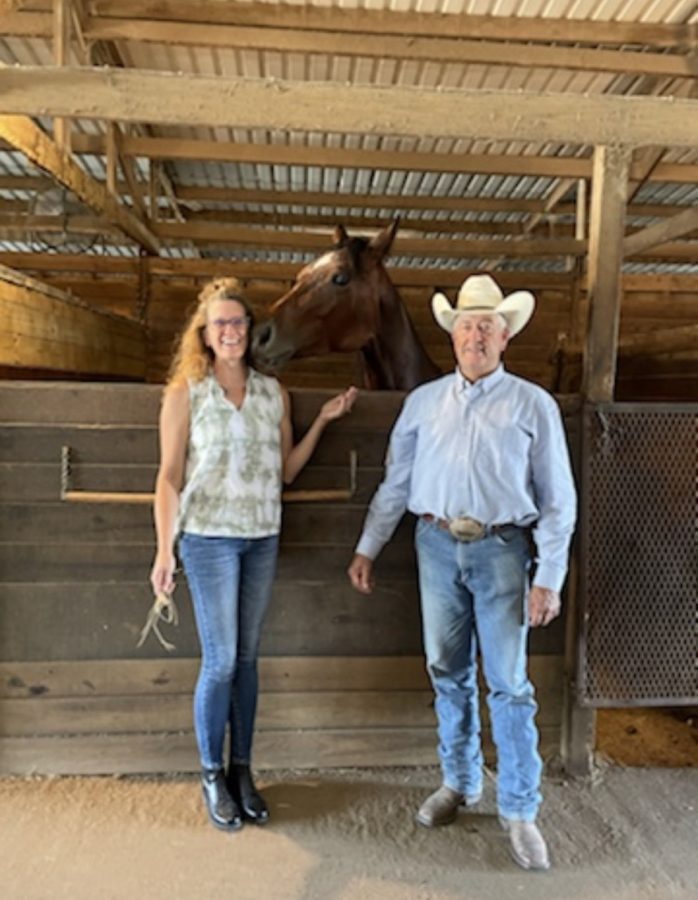Ag Spotlight: Gillespie Ranch Insider
The hidden gem horse ranch tucked away in Dublin, Texas for the last 20 years
Amy and Fred Gillespie alongside their two-year-old APHA mare. She is a third generation mare on the Gillespie Ranch.
Amy and Fred Gillespie have been located in Stephenville, Texas since 1991. Amy, Tarleton alumni, and her husband now reside in Dublin, Texas, where they breed, raise and train reining and hunt seat horses.
“Anybody can find a niche [in the equine industry,] there’s so many. Between disciplines, breeds, levels, and you can give lessons or you can show. I mean it’s endless what you can do,” Amy stated.
“You can find your niche in the horse business,” Fred added, “you can be a vet, you can be a sales rep, you can sell saddles or trucks. I mean there’s just so much going on with it. I think as a place to raise a family, it’s kind of unbeatable.”
According to equinebusinessassociation.com, the equine industry is not only worth billions of dollars in the United States, but also in countries like Europe, Canada, and Australia. Along with that, comes the 1.6 million full time jobs that come from the industry.
“All of our brood mares that we have now are ones that we have shown and raised, some second and third generation,” Amy shared. “They’ve all won some sort of national or world title, futurity money, or something. We’ve done something with them so their babies are more marketable. We breed everything AI [Artificial Insemination,] we pick stallions that are big money earners, they have to be marketable is the main thing. Pretty and marketable.”
The Gillespie’s mostly sell their horses to other performance horse riders, but have sold horses used for other purposes as well, such as racing and breeding. The horses that are bred are most often privately sold to the Gillespie’s returning customer base, though occasionally they do attend sales. As the equine industry has changed, so has what their ranch looks for in terms of genetics.
“I think the biggest lesson we have learned is you have to stay current. We try to pick up and coming stallions or ones that have won some stuff. We try to stay trendy,” Amy said.
“Something I learned from an old vet,” Fred added, “is that the numbers don’t matter. . . We try to go for that quality.”
Once the Gillespie’s AI their broodmares, Amy tends to the foaling out process, which is the birthing process of the young horses they produce. They keep those foals for about a year until they are ready to be marketed. Amy also tends to the photography aspect of their business, producing photos of horses for ads and posts.
“Occasionally, we will keep one to show,” Fred said.
Fred shared that often he gives the horses 30 to 60 days before he decides what to do with a show horse. The Gillespie’s have had horses go from all over the United states to the Netherlands, Australia, Canada, Italy and even Mexico.
“Anybody can make it [in the equine industry,] if you’re willing to put in the work, huge amounts of hours, and personal sacrifice,” Fred stated. “I think the future of the horse business is amazing, from the reiner end of it.”
The Gillespie’s share that from the beginning of their horse journey to now, the industry has evolved. They expect to see more and more good things from it.
“I think we will stay steady doing what we do. We do everything ourselves. That’s our niche and that’s what works for us,” Fred said.
The Gillespie’s are one of many names that make a living in the $122 billion industry that is the equine industry. The United States equine industry is a favorable industry in terms of making a profitable impact back into America’s economy. Activities within this industry that are essentially money earners include: recreation events, racing, showing, and working.
According to horsecouncil.org, a total of 81 million acres of land in the United states is used for horse related purposes, whether that be owned or leased. Ultimately, the equine industry is essential to the United States because of the amount of employment opportunities it provides and the amount of money tied back to the industry.
For more information regarding the equine industry and its opportunities, visit www.equinebusinessassociation.com and www.horsecouncil.org. To find out more about the Gillespie’s and their horses, find them on Facebook or visit https://gillespieranch.com/.





